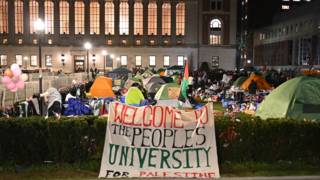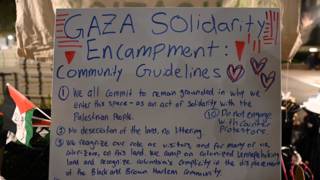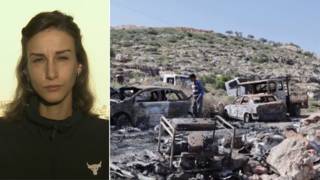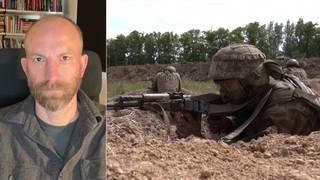
Related
Ukrainian officials are accusing Russia of committing war crimes for killing civilians. Ukrainian President Volodymyr Zelensky and EU leaders condemned images of dead civilians in the Kyiv suburb of Bucha, where corpses were found littering the streets after Russian troops withdrew from the area, some with their hands bound behind their backs. On Friday, Amnesty International also published a report that independently verified Russia has violated international law in using banned cluster munitions and other weapons that indiscriminately kill civilians. “What’s been going on during the entire more than a month now of conflict merits serious investigation and accountability for the perpetrators,” says Joanne Mariner, crisis response director at Amnesty International, who co-authored the report. “Given this relentless bombardment of civilian neighborhoods and districts, we’re calling for the establishment of safe humanitarian corridors to allow civilians to escape.”
Transcript
AMY GOODMAN: This is Democracy Now!, democracynow.org, The War and Peace Report. I’m Amy Goodman, as we turn to Ukraine. Ukrainian officials are accusing Russia of committing war crimes for killing civilians. A warning to our audience: The images of what happened are very disturbing. Over the weekend, Ukraine regained full control of the Kyiv region after Russian troops retreated, leaving behind widespread devastation. In the town of Bucha, dozens of dead bodies were found in the streets, some with their hands and feet bound. Ukrainian officials say they also believe hundreds more people have been buried in mass graves. This is Anatoly Fedoruk, the mayor of Bucha.
MAYOR ANATOLY FEDORUK: [translated] Corpses of executed people still line the Yabluska street in Bucha. Their hands are tied behind their backs with white “civilian” rags. They were shot in the back of their heads. So you can imagine what kind of lawlessness they perpetrated here.
AMY GOODMAN: On Sunday, the Ukrainian foreign minister, Dmytro Kuleba, said the massacre of civilians in Bucha was the “most outrageous atrocity of the 21st century.”
DMYTRO KULEBA: Bucha massacre is the most outrageous atrocity of the 21st century. And by saying — we all refer to Bucha, but we should not forget about other towns and villages in the Kyiv region, which also became the crime scene for Russian army. Without an exaggeration, by what we’ve seen in Bucha and the vicinity, we can conclude that Russia is worse than ISIS in the scale and the ruthlessness of the crimes committed.
AMY GOODMAN: The United Nations Secretary-General António Guterres said he was “deeply shocked” by the images from Bucha and called for an independent investigation. Ukraine has asked the International Criminal Court to visit Bucha to gather possible evidence of war crimes. Russia has denied killing civilians, claimed the footage and photographs from Bucha are a “staged performance” by Kyiv.
For more, we’re joined in London by Joanne Mariner, the crisis response director at Amnesty International, co-author of the new Amnesty report titled “Ukraine: Russia’s cruel siege warfare tactics unlawfully killing civilians — new testimony and investigation.”
Joanne, welcome to Democracy Now! Could you start off by responding to this latest news that is just being exposed as Russian forces pull away from Kyiv and the surrounding areas, moving in on the east, what is being shown right now, what’s being discovered with these mass graves?
JOANNE MARINER: Absolutely. We are as shocked as everyone at these reports of mass graves, of civilians being found with their hands and feet tied — obviously, indicia of extrajudicial executions by Russian forces — and other war crimes. So we are looking to investigate these crimes by interviewing witnesses and family members of those who are killed. We also think it’s really important to clarify the circumstances of these killings, so we’d like to see forensic investigators deployed, you know, people could examine the bodies in a medical way and assess whether people were shot while captive at close range or whether they were shot in the crossfire in the kinds of indiscriminate attacks that we’ve seen that are characteristic of the warfare we’ve been seeing. But certainly, the evidence we’ve seen so far is extremely disturbing and merits the most serious investigation.
AMY GOODMAN: And the response of Russia, saying that these are staged events, that they did not kill civilians?
JOANNE MARINER: I mean, that’s a textbook denial. We’ve seen perpetrators in many instances make those kinds of denials falsely. But it’s also worth noting that, you know, there have been staged incidents in other conflicts, so that’s why you don’t immediately jump to conclusions and say this is absolutely a war crime. You need to investigate it to make that — you know, to analyze the evidence [inaudible] and then move in a — you know, hopefully reach a conclusion that will stand up in court, because, obviously, the kinds of — I mean, not just what we’re seeing over the weekend, but what’s been going on during the entire more than a month now of conflict, merits serious investigation and accountability for the perpetrators. And so, that’s why you’ve seen the International Criminal Court saying specifically that it’s investigating these crimes.
AMY GOODMAN: Can you talk about the results of your study that you did? What did you find?
JOANNE MARINER: Yeah, as I’m sure your viewers know, Russian forces have been laying siege to a string of Ukrainian cities over the past 40 days, including Mariupol, Kharkiv, Sumi, Chernihiv. We have interviewed survivors of sieges in five of these cities and cross-checked their testimonies using satellite imagery and other digital investigative techniques. And we’ve documented a pattern of indiscriminate attacks that have killed and injured civilians. We’ve documented indiscriminate Russian attacks that have struck schools, hospitals, shopping centers, areas where civilians typically gather and that have a civilian function, even civilian passenger cars of people trying to flee these cities under siege. So, given the really overwhelming evidence we’ve collected, we’ve concluded that unlawful indiscriminate attacks, a defining feature of Russia’s cruel approach to siege warfare. And this siege warfare, even though they’ve withdrawn from a [inaudible] of areas, it’s [inaudible] ongoing model. It’s [inaudible] —
AMY GOODMAN: I want to go to Ukraine’s Defense Minister Oleksii Reznikov speaking Sunday about the massacre in Bucha.
DEFENSE MINISTER OLEKSII REZNIKOV: [translated] This is not a special operation. These are not police actions. These are ordinary racists/fascists, and these are inhuman, who simply committed crimes against civilians, raped, killed, shot them in the back of the head. The whole world needs to know about this.
AMY GOODMAN: Now, that’s going back to Bucha, the latest, what’s happening there. But again, Joanne Mariner, if you could continue with what you found and also the issue of humanitarian corridors, what that means and if Ukrainians have succeeded in establishing them and Russians respecting them?
JOANNE MARINER: So I mentioned that we’ve documented indiscriminate attacks. I mean, one of the key problems is Russian forces are using inherently indiscriminate weapons, so, specifically, cluster munitions, which are widely banned, and explosive weapons with wide-area effects, such as so-called dumb bombs, unguided bombs and multiple-launch rocket systems. Those weapons are absolutely not appropriate for use in densely populated civilian areas. They are predictably going to kill civilians, and Russian forces use them in the knowledge that civilians are going to be killed. And doing so is a war crime.
So, just to cite a few examples, in Kharkiv, we have — we have our Crisis Evidence Lab, that uses digital investigative techniques, and we’ve documented 22 separate incidents in recent weeks that have damaged civilian infrastructure, from schools to clinics to ambulances. In Chernihiv, we documented the use of dumb bombs in a civilian neighborhood in an attack that killed an estimated 47 people, including a number of people who were just standing in line for bread.
Given this relentless bombardment of civilian neighborhoods and districts, we’re calling for the establishment of safe humanitarian corridors to allow civilians to escape and to allow humanitarian aid to come in for those civilians who choose not to or are unable to escape. And even though the parties to the conflict have agreed in principle to establish these corridors, in practice, they have violated — you know, they have not been protecting these corridors from the effects of warfare. So, the ICRC, the Red Cross, has on multiple occasions now tried to establish a humanitarian corridor into Mariupol and has failed, most recently this weekend. You know, in the absence of such a corridor, you see civilians risking their lives trying to escape, civilian convoys coming out. But, you know, we’ve interviewed civilians who have witnessed people being killed in such convoys.
AMY GOODMAN: You also have this situation —
JOANNE MARINER: And just another problem, I think —
AMY GOODMAN: Go ahead.
JOANNE MARINER: Just another problem with the use of these corridors that we want to highlight is there really needs to be an effort made to rescue and protect particular vulnerable groups — older people, people disabilities, anyone with — injured, with limited mobility. Because, you know, we’ve interviewed a number of these people. They’re pretty much all trapped in basements, facing shortages of food, of clean water, of heat. You know, they’re facing literal starvation. And they don’t have access — many of them don’t even have access to information to know how to get out, let alone have the ability, have the mobility, that would allow them to get out. So it’s these vulnerable people that are most likely to be the victims of the ongoing Russian attacks.
AMY GOODMAN: You also have the Ukrainian government saying they’re investigating a viral video circulating on social media that appears to show Ukrainian soldiers shooting Russian prisoners of war in the legs and beating them. I think it was on the outskirts of Kharkiv. Can you talk about — did you find anything like that?
JOANNE MARINER: Absolutely. I mean, we’ve seen the video. If confirmed — you know, the video shows the beating and shooting of captured combatants, people that legally should be considered prisoners of war and should be treated humanely. That absolutely needs to be investigated. And if confirmed, the responsible soldiers should be prosecuted.
We’re also concerned that the Ukrainian authorities have posted videos showing captured Russian soldiers, you know, describing their circumstances of how they ended up in the conflict. This, too, is a violation of Geneva Conventions. You are not supposed to expose prisoners of war to public curiosity. And these people, when and if they return to Russia, could face quite serious repercussions for appearing in these kinds of videos.
AMY GOODMAN: And you talk about anti-personnel landmines, cluster bombs. All of these that Ukraine has raised, the U.S. has raised, Western countries have raised, is a violation of international law. The U.S. has not signed on to the anti-landmine treaty, for example, or the cluster bomb treaty. Do you think this could lead to a change in the U.S.’s attitude towards international law, actually endorsing it, even the ICC, and International Criminal Court?
JOANNE MARINER: I hope so. I mean, we’ve — you know, Amnesty International has documented U.S. killing of civilians, destruction of civilian neighborhoods in Syria, and particularly the city of Raqqa, which if you look at photos of it, it was — you know, buildings were completely destroyed. So, I think everyone should be learning lessons. It’s not one set of rules for the enemy and a different of rules for yourself. You know, if they’re supporting the ICC in this context, they might understand the need for a strong International Criminal Court for generally. We don’t want to have a problem of victor’s justice.
AMY GOODMAN: Well, Joanne Mariner, we thank you so much for being with us, crisis response director at Amnesty International. I’m Amy Goodman.












Media Options